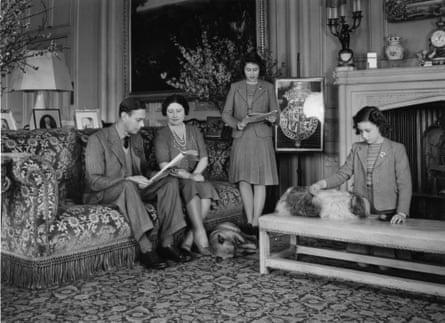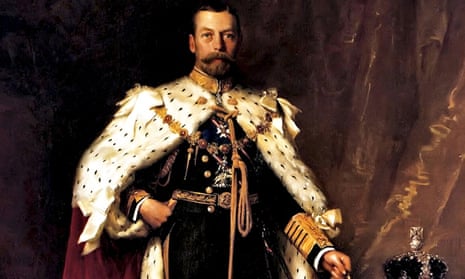Queen Victoria was not the most Victorian of our monarchs. She enjoyed sex, bought modern art, liked looking at drawings of naked men, was emotionally self-indulgent, histrionic and luxurious, neglected her public duties and preferred people lower down in the social scale (whether politicians such as Disraeli or confidants such as the drunken gillie John Brown). Victorian values, as we understand them, reached their apogee in the reigns of her grandson George V (1910-36) and his son George VI (1936-52). They were our two Spartan monarchs, duty-bound, sexually repressed, emotionally disciplined, wanting everyone kept in place and convinced that material discomfort improved people’s characters. And to a great extent, their subjects emulated their example, and made mid-20th-century Britain into a nation that was conventional, stable, prudish, dingy and insular. Neo-Georgian Britain was nothing if not self-respecting and therefore law-abiding.
The Penguin Monarchs series, which is producing 45 elegant miniatures on the life and times of every monarch from Athelstan to Elizabeth II, gets off to a strong start with the two Georges who bore the world’s greatest royal inheritance in a century of world wars and global crises. David Cannadine, in particular, makes the case that George V proved one of the most influential of rulers on the character of both the monarchy and nation.
In his formative years, until the sudden death of his elder brother, George V had no expectation of inheriting the crown. As a younger son, he had a lousy home education, before entering the Royal Navy when still an unschooled child. Knowing that he lacked the trained mind to analyse data and assess situations, he was at best diligent and conscientious, but at worst tense and choleric about important decisions.
Early in his reign he faced the most testing domestic challenges of any 20th‑century English monarch. First, in 1910-11, there was the constitutional crisis caused by the veto pronounced by the Tory-dominated House of Lords over the Liberal government’s legislation. Then in 1913-14, there was the furious controversy over Irish home rule, which many observers expected to end in civil war. His provincial tours, and visits to hospitals and factories – unprecedented in number – started early in his reign, and were intended to unify a politically divided nation. He brought the crown closer to his people than any previous monarch. In his reign, the UK became, for the first time, convincingly united: provincial loyalties and regional pride were diminished by a tighter national identity; national newspapers for the first time outsold locals.
As king after 1918 he presided over the transition to full adult suffrage, and reconciled the Labour party to constitutionalism. Although he favoured the Tories, Labour’s Ramsay MacDonald became his favourite prime minister. As a devout but undemonstrative Anglican, who read the Bible every day, George V assumed “a quasi-priestly role”, both protective and fatherly towards his countrymen, says Cannadine. He was an authoritative yet emollient public speaker, who commended the community virtues of duty, service and self-respect. His first Christmas radio broadcast in 1932 – written by Kipling – was a triumph. Thereafter his intimate seasonal messages enhanced the mystique of the monarchy as they enthralled listeners. The long-remembered silver jubilee celebrations of 1935 expressed collective gratitude for his constancy, dutifulness and paternalism.
George V was the first monarch since 1714 who was not a fluent German speaker. His French was poor. In consequence, he preferred the English-speaking empire to complicated, multilingual Europe; he mistrusted “abroad” more than any ruler since medieval times. What’s more, the first world war plucked the monarchy away from its traditional basis in European royal cousinhood (five emperors, eight kings and 18 minor dynasties lost their thrones during George V’s reign). The monarchy became imbued with a narrower sense of national identity. George’s reluctance to travel abroad was accentuated by the fact that his exemption from taxes was conditional on him defraying the costs of state visits overseas. Apart from the imperial Indian durbar of 1911, he made only three state visits: to Paris in 1914 and to the kingdoms of Belgium and Italy in 1922-23.
Although reputed to be unbookish, George V was a persevering reader, who set himself a book each week, and was far better read than most of his subjects. He liked gramophone records, preferably of sugary music, which he replayed interminably to the exasperation of his guests. He was a movie buff, with a taste for farces starring cheeky working-class comedians. His hatreds included new or foreign music, fashions and dances; girls who used nail varnish or did not ride horses side‑saddle; communists, fascists, submarines and chemical warfare. He shook his stick at a Cézanne in the National Gallery, to whose director he declared: “Turner was mad. My grandmother always said so.”
As a father, George V was a martinet, who berated his sons with physical and verbal violence. His terrifying outbursts of temper were sometimes lightened by rough banter, which caused the enduring abasement of his sons. His second son, known to history as King George VI, had “in many ways, a ghastly life”, writes Philip Ziegler. He suffered various physically painful or emotionally scarring degradations in boyhood. After dismal education by an ignorant and philistine clergyman, he was enrolled as a naval cadet aged 14, and – shy, reticent, angry, with a mortifying stammer and disabling gastric troubles that necessitated several operations – he bore a hard, lonely, humiliating life only because it was impossible to give up. These frustrations made him ferociously short-tempered for life.
George VI was saved by his marriage in 1923 to the gracious, photogenic and supportive Lady Elizabeth Bowes-Lyon. After the abdication crisis of 1936, he replaced his flashy elder brother Edward VIII and determined to re-establish the monarchy as the paradigm of decorum, reliability and reassuring staidness that it had been during his father’s reign. He scrutinised official papers, formed his own views and expressed them. Like most of his subjects, he was desperate to avoid another European war, and made overt public gestures of support for Neville Chamberlain’s appeasement of Hitler.
In wartime, he read top-secret material, including Ultra transcripts, and was tireless in touring blitzed districts, clambering through debris, and giving his condolences to people in their wrecked homes. “The royal presence still had near-magical properties to raise the spirits and enhance the self-respect of those who had been left sorely battered by the war,” reports Ziegler, who suspects that the king in wartime must have “resented the fact that it was Churchill, Churchill, Churchill all the way while the head of state was left to pay a secondary role”.
After a lifetime of heavy tobacco use, George VI developed lung cancer and died in 1952, aged 56. Ziegler presents him as an unimaginative but selfless practitioner of Victorian values, instilled with notions of honour and service, whose experiences as a monarch honed his “ability to distinguish between the trivial and the important, the authentic and the spurious”. He was, Ziegler concludes, “extraordinary in his ordinariness”, which was exactly what his subjects wanted.
Cannadine and Ziegler have accomplished miracles of lucid compression in these small books. Only one shortcoming has emerged. It is customary nowadays to minimise royal courts as full of flummery, and filled with fusspots, toadies and parasites. But the court was a major state institution, equivalent to the houses of parliament or the judiciary, and its workings, personnel, group intelligence and moral compass deserve more detailed attention than Cannadine and Ziegler allow. It is too much of a 21st-century perspective to think that courtiers lacked national influence. In the reigns of the recent Georges, as both authors show, much of the nation took its tone filtered down from the court.
To buy George V: The Unexpected King or George VI: The Dutiful King for £8.79 (RRP £10.99) go to bookshop.theguardian.com or call 0330 333 6846.


Comments (…)
Sign in or create your Guardian account to join the discussion